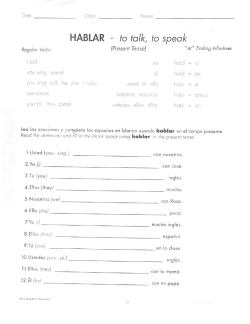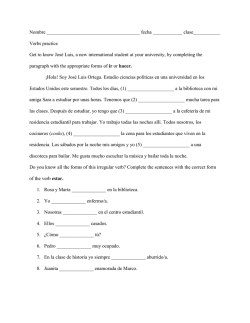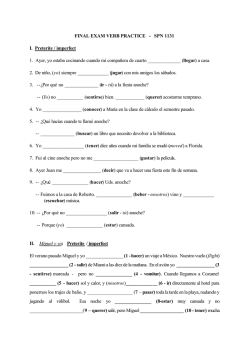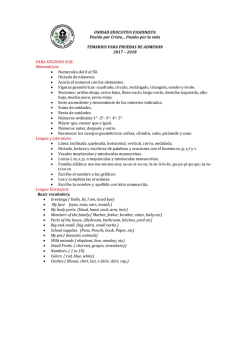
The Present Progressive
)( 2 e gressiv o r P t n se 1.2 Pre re: The Nomb Present Progressive : Fecha How to form the present progressive: s Hora: 4HE PRESENT TENSE OF estar + el gerundio of any verb. estoy estás está s ESTAR estamos x están Yo estoy estudiando. Tú estás comiendo. "ESIDES estar, the verb continuar can be used with the present participle. Ella continúa leyendo a la clase. 3HE KEEPS RIGHT ON READING TO THE CLASS CONTINUAR continúo continuamos continúas x continúa continúan Pronombres reflexivos me nos te x se se Forma una oración: * Means that it is an -ir stem-changing verb or its gerund ends in yendo. Sujeto Él Estar o continuar ESTÉCONTINÞA Verbos (to form the gerund) *(dormir) Nosotros (hablar) Ellos (correr) Ustedes (vivir) Tú *(repetir) Yo *(creer) María JUGAR Pablo y Elisa (entender) %L SE×OR 3ÉNCHEZ *(servir) Gloria y yo (recibir) 378 Gerundio (gerund=ing) durmiendo. 21.2 Present Progressive Reflexive pronouns are attached to the -ando/-iendo or they can be placed before the CONJUGATED VERBS )( essive r g o r P resent 21.2 P re: Nomb : Fecha Create a sentence withB the provided Subject/Sujeto, theHcorrect conjugation of ora: Present progressive Estar, and the correct Gerund of the infinitive provided. (Explanation on page 376) Forma una oración: * Means that it is an -ir stem-changing verb or its gerund ends in yendo. Tú (abrir) El mecánico (llegar) Mi hermano (sacar) Tu pariente (organizar) Nosotros (beber) 3US HIJOS ENOJARSE Yo (aprender) Tú (pegar) Usted (sufrir) El muchacho (subir) La policía TRABAJAR Ustedes (correr) El perro (comer) %L JUEZ (permitir) El asesino (matar) El cliente (fumar) Tú *(sonreírse) Nosotros *(leer) El bebé (romper) Los niños (esconderse) Estar o continuar 380 Gerundio (gerund=ing) 21.2 Present Progressive Yo Verbos (to form the gerund) (vivir) Sujeto resen 21.2 P %L TRABAJADOR (excavar) Tú (vender) Yo (escribir) Nosotros (compartir) Mi madre (cubrir) El operador (responder) La directora *(creer) Nosotros (nadar) Usted (escuchar) Mis amigos (patinar) Estar o continuar 381 Gerundio (gerund=ing) 21.2 Present Progressive Los estudiantes Verbos (to form the gerund) (gritar) Sujeto A. Presente Progresivo Answer Key. 1. 2. 4. Nosotros estamos comiendo. Ellos no están bailando. Yo estoy hablando. Saúl está escribiendo una carta. Cecilia y yo estamos jugando afuera. Yo estoy pensando en un nombre. El maestro está enseñando la lección. Los niños no están peleando. B. 1. 2. 4. Ellos están decidiendo ahora. Florencia no se está hundiendo. Mis amigos están abriendo la puerta ahora. Yo estoy nadando con mis amigos. Mi padre está lavando el carro. Los niños están patinando. Emilio está mandando un regalo. El autobús de turismo está pasando a la derecha. C. Answers may vary. 1. Sí, (No,) yo (no) estoy durmiendo. 2. Sí, (No,) Omar (no) está leyendo una novela. Sí, (No,) nosotros (no) estamos repitiendo el juego. 4. Sí, (No,) Casandra (no) está brincando. Sí, (No,) los niños (no) están caminando. Sí, (No,) yo (no) estoy sirviendo comida a los niños. Sí, (No,) nosotros (no) estamos pidiendo dinero a nuestros padres. Sí, (No,) yo (no) estoy diciendo la verdad. Sí, (No,) Matilde (no) está trayendo pollo a la fiesta. 10. Sí, (No,) el perrito (no) está mordiendo los zapatos de mi madre. 2 : Fecha Hora: A. Translate the following sentences into Spanish: 1. 2. We are eating. (comer) They are not dancing. (bailar) ) AM TALKING hablar) 3AÞL IS WRITING A LETTER escribir) #ECILIA AND ) ARE PLAYING OUTSIDE jugar) ) AM THINKING OF A NAME pensar) 4HE TEACHER IS TEACHING THE LESSON enseñar) 4HE CHILDREN ARE NOT lGHTING pelear) B. Translate the following sentences into Spanish: 1. 2. 4. They are deciding now. (decidir) Florencia is not drowning. (hundirse) -Y FRIENDS ARE OPENING THE DOOR NOW abrir) I am swimming with my friends. (nadar) -Y FATHER IS WASHING THE CAR lavar) 4HE CHILDREN ARE SKATING patinar) %MILIO IS SENDING A GIFT mandar) 4HE TOURIST BUS IS PASSING ON THE RIGHT pasar) C. Answer the following questions: 1. ¿Estás tú durmiendo? 2. ¿Está Omar leyendo una novela? ¿Están ustedes repitiendo el juego? 4. ¿Está Casandra brincando? ¿Están los niños caminando? ¿Está usted sirviendo comida a los niños? ¿Están ustedes pidiendo dinero a sus padres? ¿Estás tú diciendo la verdad? ¿Está Matilde trayendo pollo a la fiesta? 10. ¿Está el perrito mordiendo los zapatos de tu madre? 385 Nombre- _________________ The Present Progressive Use the presente progresivo to talk about what you are doing right now in immediate time. ESTAR is the helping verb of the presente progresivo. It must come BEFORE of the gerund or the -and or -iendo form of the verb. Write the correct conjugations of ESTAR in the verb chart below. ESTAR = TO BE **for temporary conditions and location only Yo nosotros Tu vosotros El, ella, Usted ellos, ellas, ustedes THE PRESENT PROGRESSIVE GERUNDS. -ar verbs: drop the –ar and add –ando (hablando; estudiando; trabajando; pensando) -er verbs; drop the –er and add –iendo (comiendo; bebiendo; vendiendo; poniendo) -ir verbs; drop the –ir and add –iendo (abriendo; sufriendo; escribiendo; viviendo) A. Yo estoy limpiando el bano. I am cleaning the bathroom. B. Tu estás barriendo el piso. You are sweepting the floors. Write the correct gerund or -ando or -iendo form of the verb. 1. Está _____________________ (ir) a su casa. 2. Estamos _____________________ (comer) en el restaruante. 3. Puedo ver a esa chica que le está _____________________ (dar) de comer a los animales. 4. Ud. está _____________________ (ser) antipático. 5. No sé quien se está _____________________ (quedar) en el hotel. 6. Uds. están _____________________ (mentir). 7. Estás _____________________ (venir) a mi casa tarde todos los días. 8. Mi madre nos está _____________________ (oír). 9. Nuestros padres están _____________________ (leer) en el estudio. 10. Nosotros no estamos _____________________ (dormir). 11. Vosotros os estáis _____________________ (reír) demasiado. 12. Mi hermana se está _____________________ (vestirse). 13. Creo que mis mejores amigos no están _____________________ (pedir) su desayuno. 14. Yo no estoy _____________________ (sentir) mis piernas. 15. ¿Quién está _____________________ (decir) esas mentiras? Write the correct Spanish present progressive phrase in the blank. **Remember that this compund verb phrase requires two verbs. Ahora es una noche muy aburrida. Yo ______ (estar)________ (hacer) muca tarea y yo _______ (estar) ___________(trabajar) mucho en mi dormitorio. Yo no _______(estar)_________ (mirar) la televisión. Mi hermano menor ___________ (estar) _________ (jugar) con mis videojuegos, y por eso entonces nosotros ______(estar) __________ (luchar). Ahora mi hermano y yo _________(estar) ______(hacer) nuestra tarea tranquilamente. En la cocina mi mama ________ (estar) __________ (hacer) un cena muy rica. Answer the following questions with complete sentence Spanish answers. 1. ¿Qué estás haciendo? 2. Piensa en tu mejor amigo. Ayer ¿qué está haciendo él o ella? 3. Qué están haciendo tú y tus amigos? En casa . . . 1. ¿Qué está haciendo tu mamá en la cocina? 2. ¿Quién está mirando la televisión en la sala? 3. ¿En qué cuarto estás haciendo tu tarea 4. ¿Qué están haciendo ustedes en el comedor? What are you doing right now? Write a short paragraph about what you are doing NOW. Begin with the the word- Ahora (now).
© Copyright 2026



